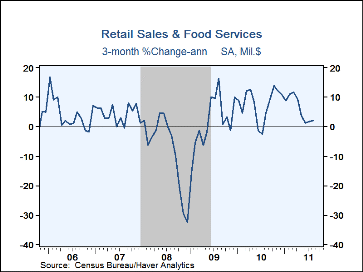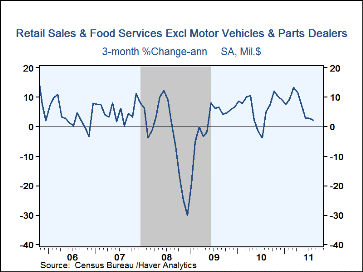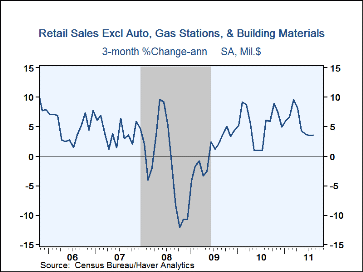 Global| Sep 14 2011
Global| Sep 14 2011U.S. Retail Sales Are Flat & Disappointing
by:Tom Moeller
|in:Economy in Brief
Summary
The consumer continues to pull back the reins on spending.Total retail & food service sales were unchanged last month following a 0.3% July gain, revised down from 0.5%. The August figure fell short of Consensus expectations for a [...]
 The consumer continues to pull back the reins on
spending.Total retail & food service
sales were unchanged last month following a 0.3% July gain, revised down
from 0.5%. The August figure fell short of Consensus
expectations for a 0.2% rise, according to the Action Economics survey.
Though spending still seems firm when looking at the 7.2% y/y increase,
weakness shows up when looking at spending during the last three months.
It shows an only 2.1% (AR) rise versus double-digit growth during Q1'11
& Q4'10.
The consumer continues to pull back the reins on
spending.Total retail & food service
sales were unchanged last month following a 0.3% July gain, revised down
from 0.5%. The August figure fell short of Consensus
expectations for a 0.2% rise, according to the Action Economics survey.
Though spending still seems firm when looking at the 7.2% y/y increase,
weakness shows up when looking at spending during the last three months.
It shows an only 2.1% (AR) rise versus double-digit growth during Q1'11
& Q4'10.
Some of that weakness is due to spending on autos, but not much. Spending on motor vehicles slipped 0.3% last month after a 0.2% July gain. Excluding autos, August retail sales ticked up just 0.1% versus a 0.3% expected gain. A 0.3% rise during July was downwardly revised from 0.5%. Three-month growth in nonauto sales of 2.2% also follows double-digit rates of increase during Q1'11 & Q4'10.
Recent stability in gasoline prices continued to be reflected in just a 0.3% m/m sales gain at service stations (20.8% y/y), after a 0.9% July increase. Excluding gasoline and autos, retail spending ticked up 0.1% just last month. Three-month growth in sales of 3.7% follows a peak of 8.1% during Q4'10. Finally, sales of building materials nudged up 0.2% (6.7% y/y). A notion of "core" retail sales is sometimes valuable in suggesting how sales will trend after temporary distortions fade. Therefore, excluding gasoline, autos and building materials, which together account for one third of what consumers buy, retail sales ticked up 0.1% (5.5% y/y) after 0.4% increases in both July & June. The three-month growth rate of 3.6% was half the Q1 peak.
Discretionary spending was generally soft in August. Apparel store sales fell 0.7% (+5.6% y/y) after a downwardly revised 0.3% July decline. Also, sales at general merchandise outlets ticked up just 0.1% (3.8% y/y) after an upwardly revised 0.4% July rise. Sales of furniture, home furnishings and appliances rose 0.2% (0.9% y/y) after a little-revised 0.9% July gain. Sales at food service & drinking places slipped 0.3% (+3.9% y/y) for the second down month. Finally, non-store retailer sales rose a firmer 0.5% (10.4% y/y) in August. Currently, sales by electronic shopping & mail-order houses account for roughly ten percent of nonauto retail sales less building materials & gasoline.
The retail sales figure are available in Haver's USECON database. The Action Economics figures are in the AS1REPNA database.
| Retail Spending (%) | Aug | Jul | Jun | Aug Y/Y | 2010 | 2009 | 2008 |
|---|---|---|---|---|---|---|---|
| Total Retail Sales & Food Services | 0.0 | 0.3 | 0.2 | 7.2 | 6.4 | -7.0 | -1.2 |
| Excluding Autos | 0.1 | 0.3 | 0.1 | 7.3 | 5.7 | -5.5 | 2.1 |
| Retail Sales | 0.1 | 0.3 | 0.2 | 7.5 | 6.8 | -7.8 | -1.6 |
| Motor Vehicle & Parts | -0.3 | 0.2 | 0.5 | 6.4 | 10.0 | -13.7 | -14.0 |
| Retail excluding Autos | 0.2 | 0.4 | 0.1 | 7.8 | 6.1 | -6.3 | 2.1 |
| Gasoline Stations | 0.3 | 0.9 | -1.8 | 20.8 | 16.8 | -22.2 | 10.4 |
| Non-Auto Less Gasoline | 0.1 | 0.3 | 0.5 | 5.7 | 4.2 | -2.9 | 0.9 |
| Food Service | -0.3 | -0.4 | 0.4 | 3.9 | 2.7 | -0.5 | 2.2 |
Tom Moeller
AuthorMore in Author Profile »Prior to joining Haver Analytics in 2000, Mr. Moeller worked as the Economist at Chancellor Capital Management from 1985 to 1999. There, he developed comprehensive economic forecasts and interpreted economic data for equity and fixed income portfolio managers. Also at Chancellor, Mr. Moeller worked as an equity analyst and was responsible for researching and rating companies in the economically sensitive automobile and housing industries for investment in Chancellor’s equity portfolio. Prior to joining Chancellor, Mr. Moeller was an Economist at Citibank from 1979 to 1984. He also analyzed pricing behavior in the metals industry for the Council on Wage and Price Stability in Washington, D.C. In 1999, Mr. Moeller received the award for most accurate forecast from the Forecasters' Club of New York. From 1990 to 1992 he was President of the New York Association for Business Economists. Mr. Moeller earned an M.B.A. in Finance from Fordham University, where he graduated in 1987. He holds a Bachelor of Arts in Economics from George Washington University.








